11/22 (Fri) Session
Premium Session
PS-01 Municipal Government ICT Summit 2013
12:00 ~ 13:30 / room9

Tsuneo Ishii
Deputy Mayor, Fujisawa City, Kanagawa

Hideo Kishimoto
Mayor, Genkai Town, Saga

Yoshio Kusama
Mayor, Takahagi City, Ibaraki

Akinari Takehisa
Mayor, Setouchi City, Okayama

Nobuaki Hattori
Mayor, Chigasaki City, Kanagawa

Takahisa Fuse
Mayor, Tome City, Miyagi

Hyakuo Makita
Mayor, Sabae City, Fukui

Jiro Kokuryo
Vice-President / Professor, Faculty of Policy Management

Mihoko Sakurai
Project Assistant Professor, Graduate School of Media and Governance
The ICT environment surrounding us has been changed dramatically, that is, rise of smartphones and cloud service. These changes strongly affect administrative services as well. We argue about the influence of using mobile devices in administrative services, we call it “Bring Your Own Device (BYOD)” and possibility of applications work on that device.
In the last of the session, we will commend “local government application contest” grand prix work that regional information research consortium sponsored this autumn.
PS-02 With Great Data Comes Great Health
12:15 ~ 13:45 / room5

Takeshi Kawano
Senior Manager, Health&Public Service, Accenture Japan Ltd

Shinsuke Tagami
Director, Intel Japan, Community & Healthcare Business Development Group, Business Innovation Group, Intel K.K.

Masahiko Nemoto
Chief Information Officer, Kanagawa Prefectural Government

Jun Murai
Dean and Professor, Faculty of Environment and Information Studies

Tomiaki Morikawa
Associate Professor, Graduate School of Media and Governance
For the further development of our country and the sustainment of a society with healthy long-living people, healthcare innovation that ensures health and longevity is hoped for. To achieve this, a field for empirical experiments where industries, universities and the government jointly work to create prototypes of future-oriented healthcare and system medicine that utilize cutting-edge, cloud-based information and communications technologies and exhaustive molecular/image analysis techniques in addition to traditional manufacturing skills is necessary. However, difficulty in obtaining cooperation from people engaged in healthcare as well as inconsonance with the common concept of big data due to the particularity of medical privacy could serve as inhibitory factors.
This session expects researchers and business leaders from different areas to discuss the detection and solution of problems in healthcare innovation that creates our future.
PS-03 Future of 3D Printer and Personal Fabrication
13:00 ~ 14:30 / room7

Hideaki Ogawa
Ars Electronica Futurelab, Austria

Shigeru Kobayashi
Associate Professor, Research Center for Industrial Culture Institute of Advanced Media Arts and Sciences

Hiroya Tanaka
Associate Professor, Faculty of Environment and Information Studies / FabLab Japan Founder

Akira Wakita
Associate Professor, Faculty of Environment and Information Studies

Daijiro Mizuno
Assistant Professor, Faculty of Environment and Information Studies
Recently 3D printers and digital fabrication draw large attention. These environments will affect a lot of fields such as education, economy, art, medicine and architecture. In this session, we would like to think, discuss and share the future of digital manufacturing.
PS-04 [Japan Studies Platform Laboratory] Re-Thinking the Internet Governance
15:00 ~ 16:00 / room7

Yoshihiro Obata
Solutions Architect, Equinix Japan K.K.

Jean-Philippe Moiny
Ministry of Economic Affairs, Belgium

Jun Takei
Global Public Policy Director, Intel Japan / Senior Visiting Researcher, Keio Research Institute at SFC

Makoto Yokozawa
Visiting Professor, Graduate School of Informatics, Kyoto University

Jim Foster
Professor, Graduate School of Media and Governance
This session focuses on the recent argument relating to future Internet governance with respect to big data, cloud computing, SNS and a smart phones from the point of protecting consumers and children.
*w/ Simultaneous Interpretation
Sponsor Session
SS-01 < Tokyo Midotown Management Co., Ltd. Special Sponsor Session > How to Create a Community
10:00 ~ 11:30 / room9

Kuniyasu Hiraiwa
Chief Executive, NPO AFTERSCHOOL

Yusuke Miyaji
President, miyajibuta Co., Ltd.

Ikuyo Kaneko
Professor, Graduate School of Media and Governance

Yoshinori Isagai
Associate Professor, Faculty of Policy Management

Kyosuke Sakakura
Project Assistant Professor, G-SEC
How should we design a community in order to create new values? In this session, the consummators who are successful in establishing connections between people and creating new values are invited. The effective community building and problem solving measures will be discussed with audience.
SS-02 < Dai Nippon Printing Co., Ltd. (DNP) Sponsor Session > The Value of Industry-Academia Collaboration in Human Resources Development - Focus on DNP Endowed Courses "Entrepreneurship" -
12:00 ~ 13:30 / room6

Kenji Miya
Corporate Officer, Dai Nippon Printing Co., Ltd.

Nobuhiro Ariyasu
CEO & Founder, Coach United Inc.

Junto Ohki
Co-founder and the President, ShuR Group

Takahiro Ueyama
Professor, Faculty of Policy Management

Kenji Kumasaka
Professor, Faculty of Environmental Information Studies

Satoshi Kabasawa
Project Professor, Graduate School of Media and Governance
DNP Endowed Course “Entrepreneurship” is one of the flagship courses for entrepreneurship education at SFC. SFC-industry joint efforts have cultivated an SFC ecosystem that has been stimulating all SFC players not limited to its students, and has brought innovative ideas for creation of new businesses. Through introducing the SFC ecosystem, we will explore the value of industry-academia collaboration in human resources development together in discussion with the audience.
SS-03 < Fuji Xerox Co., Ltd. Sponsor Session > Patterns and Media for Leading Creative Projects to Success
13:00 ~ 14:30 / room3+4

Hiroshi Nakano
Rep. of Center for Environmental Structure Tokyo, LLC

Kazunori Horikiri
Manager, Customer Co-creation Lab, Fuji Xerox Co., Ltd.

Hideyuki Tokuda
Dean, Graduate School of Media and Governance / Professor, Faculty of Environmental Information Studies

Takashi Iba
Associate Professor, Faculty of Policy Management
When we venture into a new filed or advance projects that demand creative output, new challenges arise one after another. However, in many cases, only temporary solutions are adopted to such new challenges. It is rare that solutions are shared among different projects or organized into a system.
In this session, we will discuss what ideal media are for leading creative projects to success, through exploring the interface between the pattern language, a method for describing practical knowledge for problem solving, and new communication technologies as represented by ubiquitous computing.
SS-04 < Cisco Systems G.K. Sponsor Session > Location Information of Everything Revealing the Future Service and Business - New Market Brought by WiFi Location Service and Big Data Analysis -
15:00 ~ 16:30 / room3+4

Masanori Yoshino
Executive / Director, Systems Engineering Sales, Cisco Systems G.K.

Takeshi Natsuno
Guest Professor, Graduate School of Media and Governance

Osamu Nakamura
Professor, Faculty of Environment and Information Studies
It is almost 10 years since the penetration of WiFi networks to our lives. Now we enjoy computing with mobile WiFi routers and smart phones capable of tethering surrounded by a number of WiFi radios. Cisco Systems has been leading the creation of future wireless networking experience enriched with so-called “Big Data” including WiFi Location and spatial radio strength distribution. This session reveals futuristic and totally new services and businesses that are brought us by the data-rich intelligent wireless networks.
SS-05 < NPO Family Business Network Japan Sponsor Session > The Crisis of HAYASHIBARA and the Challenge of NAGASE & CO.
16:00 ~ 17:30 / room5

Hiroshi Nagase
President, NAGASE & CO., LTD.

Himiko Ito
Senior Visiting Researcher, Keio Research Institute at SFC

Yoshinori Isagai
Associate Professor, Faculty of Policy Management
When managing a business, facing risks is inevitable. It could be stated that only few have survived them without any support from others. However, as it is in a sport or a bet, business is also a reiteration of winning and losing, and could be given another challenge to restart as long as the loss is not fatal. In this session, the case of NAGASE & Co, the company that attempted to recover HAYASHIBARA facing the danger of bankruptcy will be discussed.
Through this case, we were able to study how managing family business is about making recoveries after the ‘loss’ up-close. It is not often that we are able to handle cases such as this, and companies obliging to have its loss be discussed openly as a research topic are even scarcer. This opportunity was made possible by the honest relationship between Isagai Laboratory and Mr. Ken Hayashibara.
SS-06 < SOI Asia LLP Sponsor Session > SOI Asia - Human resource development in Asia Big Data Innovation -
16:30 ~ 18:00 / room7

Takuya Hirai
Chairman, Committee of IT Policy at the Liberal Democratic Party / Member of the House of Representatives

Susumu Makihara
Senior Vice President (Human Resources/General Affairs), NEC Corporation

Toru Yamashita
Director and Chief Corporate Adviser, NTT DATA Corporation

Jiro Kokuryo
Vice-President / Professor, Faculty of Policy Management

Jun Murai
Dean and Professor, Faculty of Environment and Information Studies

Shinnosuke Obi
Professor, Faculty of Science and Technology

Keiko Okawa
Professor, Graduate School of Media Design

Masaki Umejima
Project Senior Assistant Professor, Graduate School of Media and Governance
Big data innovation makes real in Asia, where economic growth has leaded world. In managing big data, human capital development is essential, and it will become a keen issue in Asia. Not only education, cluster development for these advanced engineers to create innovation will affect economic growth in Japan.
EBA project in Keio University has initiated to educate those engineers and promote student exchange in Asia. In this panel, leaders in politics and industry will discuss about future perspective on big data era, based on ongoing activities in Keio University.
Session
S-01 [Japan Studies Platform Laboratory] Japan Studies and Japanese Language Education
10:00 ~ 11:30 / room6
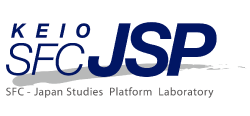
Along with the changes in the international situation surrounding Japan in recent years, both Japan studies and Japanese language education have also undergone changes. In this session, we will look at some cases showing the present condition and future scenarios for both Japan studies and Japanese language education in the world. We will discuss the relationship between the two fields, cooperation between them, and also the possibility of their contribution to the international community going forward.
URL: http://jsp.sfc.keio.ac.jp/english/
Shunichi Ikeda
Head, Japan Centre College of Asia and the Pacific, The Australian National University
Katsumi Kakazu
Executive Director, The Asian Foundation for International Scholarship Interchange
Jaqueline Berndt
Professor, Kyoto Seika University (Acting Head Graduate School of Manga Studies)
Xu Yiping
Professor, Beijing Foreign Studies University
Fumiya Hirataka
Professor, Faculty of Policy Management
S-02 How I Will Engage in the Miraisozojuku Institute for Designing the Future
10:00 ~ 11:30 / openB

Since its founding, Keio University Shonan Fujisawa Campus had a vision for the Miraisozojuku Institute for Designing the Future, now scheduled to open in Fall 2015. Faculty members will present how they will participate toward the realization of key concepts for the Institute:
- a 24-hour campus where students and faculty members can participate in residential education and research in the spirit of hangaku hankyo-learning while teaching, teaching while learning
- a university town developing together with the local community
- a global campus where the world’s knowledge will gather
URL: http://www.miraisozo.sfc.keio.ac.jp/en/
Yutaka Murabayashi
Professor, Graduate School of Media and Governance / Director, Miraisozojuku Preparation Office
Yasushi Ikeda
Professor, Graduate School of Media and Governance
Tomoyuki Furutani
Associate Professor, Faculty of Policy Management
Yasuhiro Naito
Associate Professor, Faculty of Environment and Information Studies
Preparatory Committee Members for the Establishment of Miraisozojuku
S-03 Perspective on Democracy and Capitalism toward the 22nd Century - Will the Internet Bring Us Happiness?
10:15 ~ 11:45 / room5
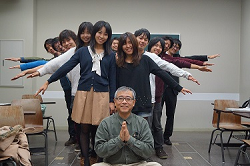
In this session, student team will present the research result on the origin and impact of capitalism, democracy, nationalism and bureaucracy in the history of modern nation states followed by the discussion on pros and cons of these four driving principles at Japan’s modernization. After presentation, three professors at SFC (Hori, Okuda, Ueyama) will investigate the alternate driving principles toward the next century which may evolve from non-Western intellectual heritage.
Shinichi Ueyama
Professor, Faculty of Policy Management
Atsushi Okuda
Professor, Faculty of Policy Management
Shigeki Hori
Professor, Faculty of Policy Management
S-04 Keio Fujisawa Innovation Village
11:00 ~ 12:30 / room3+4
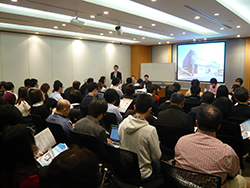
Keio Fujisawa Innovation Village (SFC-IV) is located just next to Keio University Shonan Fujisawa Campus across the street.
It is very convenient for local entrepreneurs as well as students and researchers of Keio University.
SFC-IV provides a place and opportunities for new business creation activities based upon University business seeds or joint research/development results between the University and the private sector. Since its foundation in 2006, total 60 entrepreneurs successfully started up their business, many of which have not only survived but made significant success both nationally and globally.
URL: http://www.smrj.go.jp/incubation/sfc-iv/
Yoshiteru Akita
CEO, COOKPAD Inc.
Hiroyuki Itoh
Representative Director, uhero corp.
Rintaro Gushi
Representative Director, Caloo Co., Ltd.
Kotaro Chiba
Executive Vice President, COLOPL, Inc.
Katsuya Hirokawa
Incubation Manager, Keio Fujisawa Innovation Village
S-05 [Japan Studies Platform Laboratory] Neighbors Viewing Each Other : How Japanese in China and Chinese in Japan View the Evolving Japan-China Relationship
11:00 ~ 12:30 / room7

Relations between Japan and China have come under increasing strain in recent times, especially in the wake of the conflicting positions of the two countries over the Senkaku Islands (known as the Diaoyu Islands in China) that became serious in September 2011. According to a number of surveys, it is not only the Japan-China relationship that is suffering from “antagonism”. It is also affecting people’s views of each other in both countries, reflecting the acknowledgement that deep scars remain. Where on earth is the relationship between Japan and China, close neighbors facing each other just across the East China Sea, heading?
Considering this issue, we have a tendency to forget about an important feature that is common between us. That feature is the viewpoint of how Japan is seen by Chinese people living side-by-side with people in Japan and how China is seen by Japanese people living side-by-side with Chinese people in China. How, really, is China seen by such people? How, exactly, is Japan seen? And how is the Japan-China relationship seen from such viewpoints?
This session will take a three-dimensional look at the future of the Japan-China relationship taking into account of how Japanese people living in China and Chinese people living in Japan view the issues.
URL: http://jsp.sfc.keio.ac.jp/english/
Fuminori Kobayashi
Producer of Nikkei Special "Gaia No Yoake", News Report Center, News Bureau, TV TOKYO Corporation
Junko Haraguchi
Writer / Editor
Tadanori Yoshida
Member of Editorial Board, Business News Department and Asian News Department, Editorial Office, Nikkei Publishing Inc
Tomoki Kamo
Associate Professor, Faculty of Policy Management
S-06 Thinking about English Education of Public School in Japan
12:15 ~ 13:45 / openB
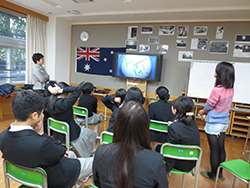
The New York Project brings workshops to 2 public junior high schools in Tokyo, aiming for the students to “enjoy using English”, and to “know about various countries”. In this session, we will clarify the significance of this project, and discuss good English education in public schools in the future.
URL: http://nypsfc.wordpress.com/
Tadashi Matsushita
Tokyo Branch Office, BLACKBOARD MFG.CO.,LTD.
Akira Watabe
Former Principal, Tokyo Sumida Ward Bunka Junior High School / The General Affairs Section, Tokyo Sumida Ward Board of Education / Senior Visiting Researcher, Keio Research Institute at SFC
Yoko Hasebe
Associate Professor, Faculty of Environment and Information Studies
S-07 Green Society ICT Life Infrastructure
13:30 ~ 15:30 / openA
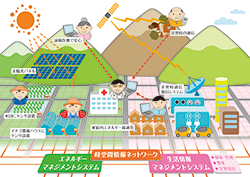
Recently, local governments in Japan have increasing need to consider extensive and effective community-based adaptation polices to cope with future climate change so that resilience of communities can be build to adapt to impacts of regional climate change. The goal of this research is to bring about a revolution in Japan social system that would materialize a new social vision aimed at forming a resilient community by increasing their social capital through organizational linkages and social supports. Okutama City, Tokyo and Kurihara City, Miyagi Prefecture were chosen for pilot studies. We analyze and estimate community’s vulnerability to climatic impacts using projections based on climate change data focused on localities. In particular, we developed Green Society ICT Life Infrastructure using sensor networks, measured information about household with respect to energy consumption, health conditions, data of conditions of agriculture crops. These results will be translated into community’s adaptation policies and will be utilized to reduce ill effects on local energy situations, health and medical conditions, and agriculture vulnerable to climate change.
URL: http://www.green-lifeinfra.com/
Tetsuya Sakashita
Director, Utilization of Digital Information Research Department, JIPDEC
Yasuhiro Kawai
Senior Researcher, Nikkei BP Clean Tech Institute
Ikuyo Kaneko
Professor, Graduate School of Media and Governance
Hiroaki Nishi
Associate Professor, Faculty of Science and Technology
Masatoshi Tamamura
Associate Professor, Faculty of Policy Management
Keisuke Uehara
Associate Professor, Faculty of Environment and Information Studies
Yingjiu Bai
Project Associate Professor, Graduate School of Media and Governance
S-08 Educating and Nurturing of Data Scientists
14:00 ~ 15:30 / openB
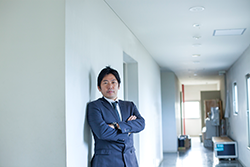
A panel discussion with individuals in the forefront of the corporate scene in regards to the nurturing of data scientists knowledgeable in architectural research handling big data as well as educating and fostering of the ability to integrate and implement information strategy into performance.
Yohei Ichishima
Project Leader, BigData Project, Nikkei BP
Takuya Kudo
Senior Principal, Accenture Analytics Japan Lead, Accenture Japan Ltd
Hiroyuki Sato
General Manager Ph.D., Analytics Service Department, BrainPad, Inc.
Tomoyuki Furutani
Associate Professor, Faculty of Policy Management
Tomiaki Morikawa
Associate Professor, Graduate School of Media and Governance
S-09 Open Data for Innovation - Can Open Energy Data Induce Open Innovation? -
14:05 ~ 15:05 / room5
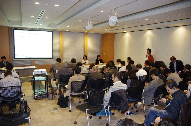
There are many challenges to induce open innovation by opening up public sector information. G8 published “Open Data Charter” and the Japanese government also included policies for open data to new IT strategy. However, there are few cases to achieve big industrial structural changes by open data. In this session, we will discuss how to induce open innovation by open data in the energy industry.
Shintaro Aikawa
VP, External Relations and Information Management, GREE, Inc.
Mikiya Kato
CEO's Office, Planning & External Affair's Group, SoftBank Corp.
Yuichiro Sugawara
CEO's Office, Business Manager of Green Energy, Rakuten, Inc.
Jiro Kokuryo
Vice-President / Professor, Faculty of Policy Management
Masaki Umejima
Project Senior Assistant Professor, Graduate School of Media and Governance
Takumi Shimizu
Project Assistant Professor, Graduate School of Media and Governance
S-10 [Japan Studies Platform Laboratory] Japan Studies and MOOC
14:15 ~ 15:45 / room9

The education curriculum of the SFC Japan Studies Platform Laboratory provides both the “Japan Studies” as well as a framework and theory necessary to position “The Japan of Today” accurately to a global audience. For those people living abroad interested in Japan, we provide a wide variety of approaches to learn about Japan, including 10-minute teaching videos available for online distribution. Recently, particularly in the U.S., the use of large-scale, free, public, college-level online education services, for example, the Massive Open Online Courses (MOOC) have been rapidly increasing. In this session, we like to talk about and discuss the potential of such new learning environments from universities.
URL: http://jsp.sfc.keio.ac.jp/english/
Toshiki Nakayama
Senior Vice President, Managing Director of Smart-life Solutions Department, Smart-life Business Division, NTT DOCOMO, INC.
Yuhei Yamauchi
Associate Professor, University of Tokyo Interfaculty Initiative in Information Studies
Jiro Kokuryo
Vice-President / Professor, Faculty of Policy Management
Jun Murai
Dean and Professor, Faculty of Environment and Information Studies
Tomoki Kamo
Associate Professor, Faculty of Policy Management
S-11 [Japan Studies Platform Laboratory] Neighbors Viewing Each Other : How Japanese in China and Chinese in Japan View the Evolving Japan-China Relationship (After Talk + α)
16:15 ~ 17:15 / openB

(To be announced)
URL: http://jsp.sfc.keio.ac.jp/english/
Tomoko Kikuchi
Photographer
Junko Haraguchi
Writer / Editor
Tomoki Kamo
Associate Professor, Faculty of Policy Management
S-12 [Japan Studies Platform Laboratory] Halal Business Front-line
17:00 ~ 18:30 / room3+4

(To be announced)
URL: http://jsp.sfc.keio.ac.jp/english/
Shinsuke Ninomiya
President, Ninomiyacorp.
Yoshiro Fukui
Dupty Manager of Tourist Promotion, Tourist Division, Tourist Business Sector, Kanagawa Prefecture Industry Labor Department
Atsushi Okuda
Professor, Faculty of Policy Management
Yo Nonaka
Part-time Lecturer, Faculty of Policy Management
S-13 “Educational Essence” of the Young Americans for Daily Life and the Future of Japanese Education
17:30 ~ 18:30 / openB
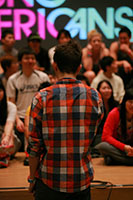
The Young Americans Project focus on “Outreach Tour”, which is the activity of The Young Americans. We work on case studies under the Support of NPO Jibun-Mirai-Club invites The Young Americans.
We expect the improvements of communication ability, self-expressiveness, independence of youth.
Ichiro Sano
President, NPO Jibun-Mirai-Club
Kan Suzuki
Former Senior Vice Minister, Ministry of Education, Culture, Sports, Science and Technology / Former Associate Professor, Faculty of Environment and Information Studies
Yoshikatsu Tsushima
Principal, Fukushima Iwaki City Yumoto Third Elementary School
Tomomi Nakamura
Cast, The Young Americans / Graduate from Faculty of Policy Management, Class of 2011
Yoko Hasebe
Associate Professor, Faculty of Environment and Information Studies
S-14 Cyberspace Safety Created by Internet Users
18:00 ~ 19:30 / room5
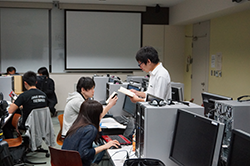
There are various kinds of threats in the cyberspace. Although government ministries and many specialists are tackling with these threats, we can find increasing importance of volunteers working for support and education for vulnerable common users who cannot protect themselves. In this session, volunteer activists and internet researchers will discuss about the significance of volunteer activities for cyberspace safety.
Keiji Oda
President, Guardian Angels Japan
Tomoko Kawase
Teacher, Daiichi High School attached to Tokyo University of Agriculture
Yasuhito Suzuki
Assistant Director for Student Guidance, Ministry of Education, Culture, Sports, Science and Technology
Waichi Sekiguchi
Reporter, Nikkei Inc.
Seiji Yoshikawa
Representative, Web 110
Ko Shikata
Professor, Faculty of Policy Management
F-01 The 11th Annual Research Conference
14:00 ~ 17:40 / room6
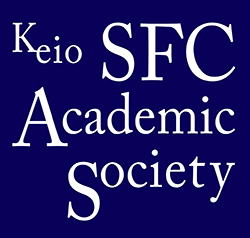
Keio SFC Academic Society provides annual opportunities for bachelor, master and doctoral students in various fields to present their research papers at Open Research Forum. This year, in addition to regular research presentations, we arrange presentations related to graduation thesis.
URL: http://gakkai.sfc.keio.ac.jp/en/index.html
F-01 The 11th Annual Research Conference Awards Ceremony
18:00 ~ 18:30 / room6
The awards ceremony will be held after the presentations.
11/23 (Sat) Session
Premium Session
PS-05 Q&A Session for High School Students
10:00 ~ 11:30 / room3+4

Takashi Iba
Associate Professor, Faculty of Policy Management

Yuichiro Shimizu
Associate Professor, Faculty of Policy Management

Sachiko Mori
Associate Professor, Faculty of Policy Management

Keisuke Uehara
Associate Professor, Faculty of Environment and Information Studies

Satoko Oki
Associate Professor, Faculty of Environment and Information Studies

Kazunori Takashio
Associate Professor, Faculty of Environment and Information Studies

Yasuhiro Naito
Associate Professor, Faculty of Environment and Information Studies
This session gives you the opportunity to ask various professors questions regarding SFC from the point of view of high school students!
Let’s talk with, and hear, the real voices of our professors!
PS-06 Nursing Practice of SFC
10:30 ~ 11:30 / room6

Hiroyuki Ishii
Assistant Professor, Research Institute for Science and Engineering, Waseda University

Nobuaki Imanishi
Associate Professor, School of Medicine

Retu Mikami
Professor, Faculty of Nursing and Medical Care

Chieko Fujii
Associate Professor, Faculty of Nursing and Medical Care
This session is about nursing education in practice. The session will be enhanced by the comfortable, natural, and informative environment of Shonan Fujisawa Campus (SFC).
The main theme of this session is venipuncture. The first topic is a technical analysis of experienced nurses using the Markerless motion capture technique. The second topic is on development of simulators with the aim of ensuring a safe method for collecting blood samples, and the third topic discusses an education program using a three-dimensional anatomic picture that will promote a better understanding of the venipuncture technique. Finally, we discuss the art and science of nursing.
PS-07 Health Science at SFC - Creating the Future Society -
12:00 ~ 13:15 / room3+4

Jun Murai
Dean and Professor, Faculty of Environmental Information Studies

Masaru Tomita
Professor, Faculty of Environment and Information Studies

Yoko Hamada
Professor, Faculty of Environment and Information Studies

Mitsuhiro Watanabe
Professor, Graduate School of Media and Governance

Miki Akiyama
Associate Professor, Faculty of Environment and Information Studies

Yasuhiro Naito
Associate Professor, Faculty of Environment and Information Studies

Yuji Ohgi
Associate Professor, Graduate School of Media and Governance

Tomiaki Morikawa
Associate Professor, Graduate School of Media and Governance
SFC is working on wide range of future-oriented health science projects from micro to macro level. Our research projects are inter-disciplinary and multi-dimensional, which imply molecular science, systems biology, biomechanics, organizational and community health studies, and health informatics applied to public health policy making. In this session, we will introduce our challenge, vision, and the future of our health science research and education programs at SFC.
PS-08 Studies with/on First-Person’s View
12:00 ~ 13:30 / room5

Hideyuki Nakashima
President, Future University Hakodate

Haruyuki Fujii
Tokyo Institute of Technology

Koichi Hori
Professor, School of Engineering, University of Tokyo

Jiro Kokuryo
Vice-President / Professor, Faculty of Policy Management

Kenji Kumasaka
Professor, Faculty of Environmental Information Studies

Masaki Suwa
Professor, Faculty of Environmental Information Studies

Ikuyo Kaneko
Professor, Graduate School of Media and Governance
Scientific studies have taken for granted objectivity, universality and reproducibility, neglecting the descriptions of the world that a person faces from the first person’s viewpoint, that is to say, the aspects of first-person’s view, embodiment, and situated-ness. Knowledge and intelligence, however, are created and applied, inherently dependent on the interactions between a person’s body and the surrounding situation, and rooted on his or her personality and life. We conjecture that if researchers fixate to a methodology of external and objective observation, studies on knowledge and intelligence will be far from sound exploration. In this session, researchers from different disciplines, such as information science, artificial intelligence, cognitive science, architecture, social science, social innovation and governance, business and management, get together and discuss the issues of studies with/on first-person’s view.
PS-09 [Japan Studies Platform Laboratory] Emulation in Anime Industry
12:30 ~ 14:00 / room7

Ian Condry
Professor, Comparative Media Studies / Head, Foreign Languages and Literatures, Massachusetts Institute of Technology, America

Tomoyuki Aosaki
DENTSU INC.

Motohiro Tsuchiya
Professor, Graduate School of Media and Governance
Anime is one of the attractions when people in the world get interested in Japan. Japanese anime programs are broadcasted in various ways in the world and they help people understand Japan. However, the size of the Japanese anime industry is not well developed and most workers in the industry cannot raise enough money. In this panel we discuss why the Japanese anime industry bloomed and how it is affecting the world.
URL: http://jsp.sfc.keio.ac.jp/english/
PS-10 Creation of Care: Living with Cancer
13:30 ~ 14:30 / room6

Yuko Takeda
Professor, Faculty of Nursing and Medical Care

Kiyoka Nozue
Professor, Faculty of Nursing and Medical Care

Mihoko Miyawaki
Professor, Faculty of Nursing and Medical Care

Mika Chaen
Associate Professor, Faculty of Nursing and Medical Care
This research development/laboratory aims for (1) practical research and development promoting best practice quality, (2) the promotion of career development of nursing leaders who can spread and utilize specific and appropriate best practices into health care setting, (3) the exploration of ethical best practices that respect the values of all parties involved, all of which are crucial for best practice.
In this session, creation of care for a fork disease of cancer will be debated widely.
PS-11 Designing Rules for the Networked Economy
14:00 ~ 15:00 / room5

Yasuko Kouno
Secretary General, CONSUMERS.JAPAN (National Liaison Committee of Consumer Organizations)

Genri Goto
Founder and CEO, Kenko.com, Inc.

Jiro Kokuryo
Vice-President / Professor, Faculty of Policy Management

Takeshi Natsuno
Guest Professor, Graduate School of Media and Governance

Sawako Nohara
Project Professor, Graduate School of Media and Governance
The online sales of medical supplies were regulated by ministerial order, however the regulation had been overturned by the Supreme Court decision. Further deregulation is being discussed via the governmental regulatory reform implementation plan. All kinds of wickedness or illegal and unfair conduct thrive in a networked society. Therefore it is necessary to ensure a secure and safe network environment. This session focuses on a discussion regarding the appropriate regulation for network use contributing to the growth and development of the economy, the stability and improvement of life of the nation.
PS-12 Future of Creative Coding
15:45 ~ 17:15 / room3+4

Akihiro Kubota
Professor, Tama Art University / JAXA

Seiichiro Matsumura
Associate Professor, Tokyo University of Technology School of Design

Junichi Murata
Director and Deputy Chief Editor, BNN, Inc.

Akira Wakita
Associate Professor, Faculty of Environment and Information Studies
Open-source creative environments (openFrameworks, Pure data and processing, etc.) are giving new possibilities for designers and artist. We are at the crossroad, rethinking the essence of creation with computers. In this session, we would like to think and share the value and the meaning of creative coding.
PS-13 The Aims and Future Direction of the ‘School of Future Creation’ (SFC)
17:45 ~ 19:15 / room3+4

Jiro Kokuryo
Vice-President / Professor, Faculty of Policy Management

Takeshi Kawazoe
Dean and Professor, Faculty of Policy Management

Jun Murai
Dean and Professor, Faculty of Environmental Information Studies

Hideyuki Tokuda
Dean, Graduate School of Media and Governance / Professor, Faculty of Environmental Information Studies

Katsuhiko Ogawa
Executive Director, Keio Research Institute at SFC / Professor, Faculty of Environmental Information Studies

Fumitoshi Kato
Miraisozojuku Preparation Office (Professor, Faculty of Environment and Information Studies)

Yasuhiro Naito
Vice Chair, Miraisozojuku Facilities Planning and Construction Committee (Associate Professor, Faculty of Environment and Information Studies)

Tomoyuki Furutani
Planning Manager, Miraisozojuku Preparation Office (Associate Professor, Faculty of Policy Management)

Yasushi Ikeda
Chair, Miraisozojuku Facilities Planning and Construction Committee (Professor, Graduate School of Media and Governance)

Yutaka Murabayashi
Director, Miraisozojuku Preparation Office (Professor, Graduate School of Media and Governance)
Fund-raising for the SFC has continued since the SFC’s 25th anniversary project. The concept involves plans for residential-type education and research facilities which can be made use of by people from all over the world. The concept aspires to the development of a global university which will create a talent pool which dares to ‘identify problems and find solutions’ on a global-scale.
This session enables the core SFC faculty members to discuss the various future SFC concepts resulting from this kind of facility; from how the Students will study, to the type of education which will take place, and to the attributes of the future professionals who will be developed here, as well as to shedding light on the mechanisms behind this kind of residential-type research/education facility.
Sponsor Session
SS-07 < Smartphone Future Contest Sponsor Session > Mobile Big-data - How Will Our Privacy Become in Future -
13:45 ~ 15:15 / room3+4

Tomoyoshi Ohno
Managing Director, Service & Solution Development Department, NTT DOCOMO, Inc.

Toshiaki Tanaka
Executive Director, KDDI R&D Laboratories

Yoshiaki Adachi
Senior Director, Product Services Planning Div, SoftBank Mobile Corp.

Hideyuki Tokuda
Dean, Graduate School of Media and Governance / Professor, Faculty of Environmental Information Studies
A lot of human activities are supported by digital devices, including cellular phones, smart phones, and smart payment cards. Those devices can be considered as sensors that automatically collect various information about our activities. This information, when collected from the mass, would enable fruitful digital services that analyze, visualize, and personalize the physical world. This means sensing and circulation of “digital facts” generate new industries.
On the other hand, such information might trespass on our privacy, if it is left uncontrolled. This session will first clarify the vision of new industries leveraging digital facts, and then shed light upon our privacy in a future-oriented manner.
SS-08 < NTT Communications Corporation Sponsor Session > Future of Web
10:00 ~ 10:30 / room9

Kensaku Komatsu
Manager, Innovative Architecture Center, NTT Communications Corporation

Jun Murai
Dean and Professor, Faculty of Environment and Information Studies

Takeshi Natsuno
Guest Professor, Graduate School of Media and Governance

Masao Isshiki
Project Professor, Graduate School of Media and Governance
(To be announced)
Session
S-15 Revitalization Project in Kuchinoerabu Island
10:00 ~ 11:30 / room5
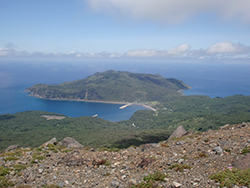
Kuchinoerabu Island, located in Kagoshima prefecture, is having a huge problem with decrease of population, which is also happening in all over Japan. To find the way to solve this problem, our two laboratories collaborates together from educational and architectural point of view.
URL: http://elove.sfc.keio.ac.jp/project.html
Mori Kifune
Conference of Future Creation
Kiyoaki Terada
Vice-Presitdent, City Planning Task force in Yakushima Island
Yoko Hasebe
Associate Professor, Faculty of Environment and Information Studies
S-16 [Japan Studies Platform Laboratory] Cyber Security in East Asia
10:30 ~ 12:00 / room7

East Asia is one of the hot places where cyber attacks are breaking out. As part of untraditional security cyber attacks are coming under the spotlight. U.S. Department of Defense defined cyber spaces as fifth operational domain and set up USCYBERCOM. In June 2013 the Japanese government also issues a new cyber security strategy. In this panel, we will discuss what are threats of cyber security and what are confidence-building measures in order to avoid accidental cyber warfare.
*w/ Simultaneous Interpretation
URL: http://jsp.sfc.keio.ac.jp/english/
Adam Segal
Maurice R Greenberg Senior Fellow, Council on Foreign Relations
Sir Jae-Chul
Senior Researcher, Korea Internet & Security Agency (KISA)
Motohiro Tsuchiya
Professor, Graduate School of Media and Governance
S-17 Invitation to Multilingual Activities - Language Education for Tomorrow
11:00 ~ 12:30 / room9
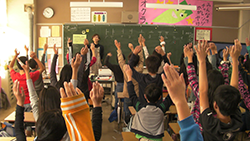
Foreign language education in Japan seems to go into the dead end: extreme English monolingualism and competition for mere skills. Japanese language education must change. In this session, from Keio University SFC where multilingualism has been one of the key concepts, we would like to send a message to whole Japan in order to revolutionize the language education at primary and secondary level.
Yukio Otsu
Professor, Meikai University
Sayaka Hata
Teacher, Tokyo Nakano Ward Arai Elementary School
Masahito Yoshimura
Professor, Nara University of Education
Kayoko Watanabe
Teacher, Saitama Sugito Town Nishi Elementary School
Atsuko Koishi
Professor, Faculty of Policy Management
S-18 Platform and Education Design for Motivating Entrepreneurs
11:15 ~ 12:15 / openB
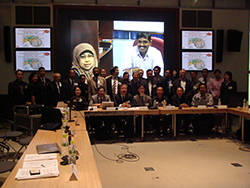
Since Keio University opened its fifth university campus in Shonan Fujisawa (SFC) in 1990, SFC has enjoyed a prominent position as a pioneer on entrepreneurship. In this session, two panelists, who have practiced entrepreneurial activities in SFC, will discuss about new challenges on entrepreneurial education and social expectation to entrepreneurship with guest speakers.
Ratnesh Kumar
Mitsubishi Corporation, Inc [SFC Alumni]
Masakazu Sakata
Weather News, Inc [SFC Alumni]
Hitoshi Tanaka
Managing Director, JIN CO., LTD.
Jiro Kokuryo
Vice-President / Professor, Faculty of Policy Management
Yoshinori Isagai
Associate Professor, Faculty of Policy Management
Masaki Umejima
Project Senior Assistant Professor, Graduate School of Media and Governance
S-19 ReDesign BOSAI
11:50 ~ 13:05 / room6
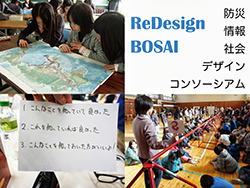
Consortium on Design of Disaster Prepared Information Society is a cooperation among industry, government and academia to design “new disaster-prevention” to realize a resilient society against disasters, by putting together knowledge from a variety of fields and continuing technological developments and social implementations. In this session, we will introduce our challenges to apply information technology, design, law and public administration studies, communication and decision-making support, educational programs, etc., to “ReDesign BOSAI” (to make new design for disaster-prevention), and discuss towards practices in the real society.
URL: http://www.kri.sfc.keio.ac.jp/en/consortium/disaign.html
Tadashi Okamoto
Tadashi Okamoto Law Office (Attorney-at-Law)
Lena Ryuji
External and Community Affairs Manager, Microsoft Japan
Jun Murai
Dean and Professor, Faculty of Environment and Information Studies / Representative, Consortium on "Design of Disaster Prepared Information Society"
Keiji Takeda
Professor, Faculty of Information Environment
Satoko Oki
Associate Professor, Faculty of Environment and Information Studies
Shoko Miyagawa
Associate Professor, Faculty of Nursing and Medical Care
Kenji Saito
Project Senior Assistant Professor, Graduate School of Media and Governance
S-20 The Frontier of ICT-driven English Education (Project-based English Program)
12:30 ~ 14:00 / openB
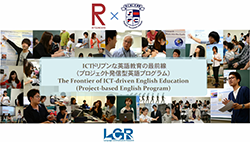
The main purpose of this session is to discuss how ICT can be the basis of college English education in Japan and to report the practice of Project-based English Program, which originally started at Keio University SFC and has been implemented at three colleges of Ritsumeikan University since 2008. Led by N. Yuji Suzuki, a professor of Ritsumeikan University and Professor Emeritus at Keio University, the program continuously seeks for new ways for students to make the most of ICT in their English learning process and produces a steady flow of successful results. The panel discussion by the faculty members and educators from both Keio and Ritsumeikan will deal with conditions and future tasks to integrate ICT with student-centered and project-based college English education in terms of hardware and software settings, web services, and on-campus networks and facilities.
URL: https://www.facebook.com/ProjectBasedEnglishProgram
Yuji Suzuki
Professor, College of Life Sciences, Ritsumeikan University / Professor Emeritus, Faculty of Environment and Information Studies
Syuhei Kimura
Lecturer, Language Education Center, Ritsumeikan University / Doctoral Program, Faculty of Environment and Information Studies
Tsukasa Yamanaka
Associate Professor, College of Life Sciences, Ritsumeikan University / Senior Visiting Researcher, Keio Research Institute at SFC
Osamu Nakamura
Professor, Faculty of Environment and Information Studies
S-21 Japan Global Wecoming
14:15 ~ 14:45 / openB

Japan as a whole, and Keio SFC specifically, strive towards a meaningful position in this increasing globalized world. The SFC’s GIGA program is a significant step in this process. We will announce the results of a cross-cultural analysis of people’s opinion of the Japan from the United States. We will then explore GIGA current situation among international and perspective international students. Finally, we will use concepts derived from Japanese tea ceremony to explore how GIGA and Japan can increase its hospitality and welcome international people and students.
Suter Jillian Rae
Master's Program, Faculty of Policy Management
Yu Chu
Undergraduate Student, Faculty of Environment and Information Studies
S-22 Discussion of “Mandatory Career Change at the Age of Forty” - From the Field of Career Support
15:00 ~ 16:30 / room6
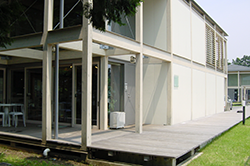
Career Resource Lab supports and promotes career-self-reliance through research studies, training career advisors, developing self-assessment tools, conducting workshops, and advising human resources professionals regarding new career support programs. In this session, we like to provide opportunity of an open discussion, regarding “Mandatory Career Change at the age of Forty”, from the viewpoint of individual’s career-self-reliance.
Noriyuki Yanagawa
Faculty of Economics, University of Tokyo
Mitsuyo Hanada
Professor, Faculty of Policy Management
S-23 Globalization and Nation-state
15:00 ~ 17:00 / room9
In globalization, Nation-states are doomed to disappear? Or are they to be reassessed? This is the question that we will discuss with Mr. Takeshi Nakano, our great guest.
Takeshi Nakano
Commentariat
Shigeki Hori
Professor, Faculty of Policy Management
S-24 Applying Pattern Languages to Business and Management
15:30 ~ 17:00 / room5
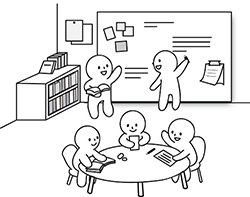
In this session, we will talk about how to apply the concept and method of Pattern Languages, which is a common language to share tacit wisdom for creation, into business and management. We will present the case that some companies apply the pattern languages to their business and management.
URL: http://ilab.sfc.keio.ac.jp/
Daiki Obara
Wilson Learning WorldWide
Sumio Iwanami
Dai Nippon Printing Co.,Ltd.
Kazuhiro Kameda
Dai Nippon Printing Co.,Ltd.
Kenji Kumasaka
Professor, Faculty of Environmental Information Studies
Takashi Iba
Associate Professor, Faculty of Policy Management
S-25 DR Congo “Acadex” Elementary School Project
15:45 ~ 17:15 / openB
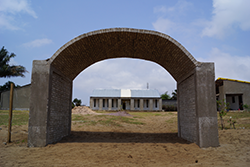
This is a project to build and run an elementary school at Kinshasa in Democratic Republic of Congo, named ‘Acadex’. This project has reached its 6th year, organized by many people including Mr. Bedelo Simon, the founder of Acadex, members from the Yoko Hasebe Laboratory and so on along with the local people.
Minga Balenge Rosette
Institut Supérieur Pédagogique de la Gombe
Masewo Mamisa Pierrette
Institut Supérieur Pédagogique de la Gombe
Ikupasa Atel Marie-Ange
Institut Supérieur Pédagogique de la Gombe
Yoko Hasebe
Associate Professor, Faculty of Environment and Information Studies
Rika Fujiya
Assistant Professor, Faculty of Nursing and Medical Care
Simon Bedelo
Part-time Lecturer, Faculty of Environment and Information Studies
Keitaro Yajima
Undergraduate Student, School of Medicine
Eri Mitsubori
Undergraduate Student, Faculty of Policy Management
Yukari Ueno
Undergraduate Student, Faculty of Environment and Information Studies
Jun Fujisaku
Undergraduate Student, Faculty of Environment and Information Studies
Nozomi Sakamoto
Undergraduate Student, Faculty of Nursing and Medical Care
S-26 Academy Camp - To Make Future Fukushima
17:00 ~ 18:30 / room6
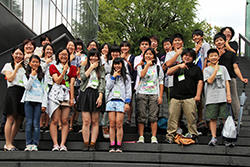
Academy Camp is a school of fun to provide children in Fukushima, affected by TEPCO F1 nuclear disaster, with opportunities to play and learn in an extreme fashion. Children and adults break out of their shells in the camp workshops hosted by professionals in a variety of fields. In this session, junior-high and high school students who participated in our past camps will take primary part in discussion of “Fukushima that we will make”.
Daisuke Ogata
Director, Academy Camp
Masaki Minami
Part-time Lecturer, Faculty of Environment and Information Studies
Kenji Saito
Project Senior Assistant Professor, Graduate School of Media and Governance
Shinobu Endo
Completed Master's Program, Graduate School of Media and Governance, Class of 2012
S-27 Reinventing the Flower Shops and the Eyeglass Industries - Industry Structure Analysis and Provocative Strategy Proposal by Student Consulting Team -
17:30 ~ 19:00 / room5
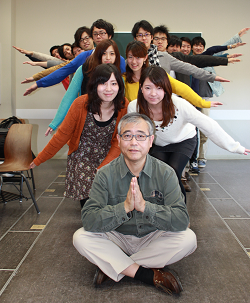
Student team at Ueyama laboratory provides real management consulting service to various consumer industries every semester. In this session, students will present the essence of industry structure analysis and strategic insight for flower shops and eyeglass industry. These industries have been mundane and rarely discussed among experts. However, team have investigated potential innovation/growth opportunities which incumbents may not realize. After presentation, executives of B2C companies who used to be our “clients” will join discussion with student team and Prof. Ueyama. Provocative opinions from the floor audiences are highly welcome.
Yusuke Tsutsumi
Director, Osix Inc.
Chiyo Hosoda
Sales Development Department, Minit Asia Pacific,Co.,Ltd
Yoji Miyaoka
CEO, Tell a Tale Inc.
Shinichi Ueyama
Professor, Faculty of Policy Management
S-28 Documentary Thesis Film Screening
17:30 ~ 19:00 / room9
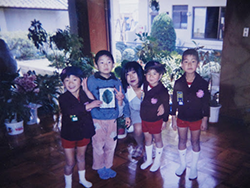
Shuhei Fujita (Former Associate Professor, Faculty of Environment and Information Studies) Documentary Lab is pleased to present an undergraduate thesis film by Keita Mukai “Chocolate cake and Horyu-ji Temple”. This film is about the memories of the director’s childhood in the residential institution and his mother who passed away when he was a little child. He visits his group mates in Nara and rekindles the lost friendship. His journey finally reaches Goto Island in Nagasaki, where his mother grew up. In the search of the past, the director tries to find the traces of compassion surrounding his life through the personal moving images and still photos.
Shuhei Fujita
Former Associate Professor, Faculty of Environment and Information Studies
Masato Ohara
Undergraduate Student, Faculty of Environment and Information Studies
Keita Mukai
Undergraduate Student, Faculty of Policy Management
G-01 Reviewing the Quarter Century after the Bursting of Japan’s Economic Bubble
13:00 ~ 14:30 / room9
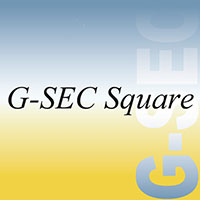
This work reviews the 25 years (the quarter century) that will, in 2014, have passed since the Japanese stock market peaked in 1989. It comprehensively examines the changes that have visited the Japanese economy during this period. Rather than seeing this period as a quarter century “lost”, this examination focuses on the theme of a quarter century of “mixed” fortunes for Japan.
URL: http://www1.gsec.keio.ac.jp/english.php
Yasuhisa Shiozaki
Member of the House Representatives
Satoru Matsubara
Professor, Toyo University
Yoshiyuki Sodekawa
Research Director, Dentsu Innovation Institute
Heizo Takenaka
Director, G-SEC / Professor, Faculty of Policy Management
G-02 From the “Recovery of the Disaster Area” to the “Reconstruction of Japan” - the Trial of Keio G-SEC Reconstruction Leader's Conference
14:30 ~ 16:00 / room7

When two and a half year has passed since the Great East Japan Earthquake and continuous effort has been put into the reconstruction in the affected areas, we need to consider enrooting sustainable regional development business instead of mere recovery from the disaster. Starting with “The Reconstruction Leaders Conference” members’ presentation of their proposals, we will discuss how to accomplish the “Reconstruction of Japan”, not just the “Recovery of the Disaster Area”.
URL: http://www1.gsec.keio.ac.jp/english.php
8 Representatives of Reconstruction Leader's Conference Members
Heizo Takenaka
Director, G-SEC / Professor, Faculty of Policy Management
Jiro Tamura
Deputy Director, G-SEC / Professor, Faculty of Law
G-03 Negotiation Workshop Concerning Conflict Management
16:30 ~ 18:00 / room7

This Workshop provides the theory and practice of negotiation and conflict management to increase understanding of conflict resolution. We will discuss a wide range of conflict negotiation processes, effective preparation methods and the ways that people negotiate effectively and resolve disputes.
URL: http://www1.gsec.keio.ac.jp/english.php
Jiro Tamura
Deputy Director, G-SEC / Professor, Faculty of Law
Koji Sumida
Guest Research Fellow, G-SEC / Professor of Law, Tokyo Fuji University
Masahiko Isshiki
Guest Research Fellow, G-SEC / Guest Professor, Kanazawa Institute of Technology Graduate School
Yuichi Sato
Guest Research Fellow, G-SEC / Glial inc.
Ryosuke Takatsuki
Guest Research Fellow, G-SEC / Guest Professor, Kanazawa Institute of Technology Graduate School / INSPiRE
Masanori Tagami
Guest Research Fellow, G-SEC / Limited Liability Company Information Technology Institute of Education
Yasuyuki Tanaka
Guest Research Fellow, G-SEC / TOKYO BROADCASTING SYSTEM HOLDINGS,INC.
Yosuke Miyoshi
Guest Research Fellow, G-SEC / NEC Corporation
F-02 The 7th Workshop on Research Activities by SFC Students
12:00 ~ 15:00 / openA

SFC have a lot of students who work on cross-sectional style, without shackled by single lab. We want to provide them a chance of asking for advice and making collaboration. So to say, this area is free presentation space for them. Please enjoy finding fun, difficulty and possibility with them.
URL: http://gakkai.sfc.keio.ac.jp/en/index.html
F-02 The 7th Workshop on Research Activities by SFC Students Awards Ceremony
17:30 ~ 18:00 / openB
The awards ceremony will be held after the presentations.
